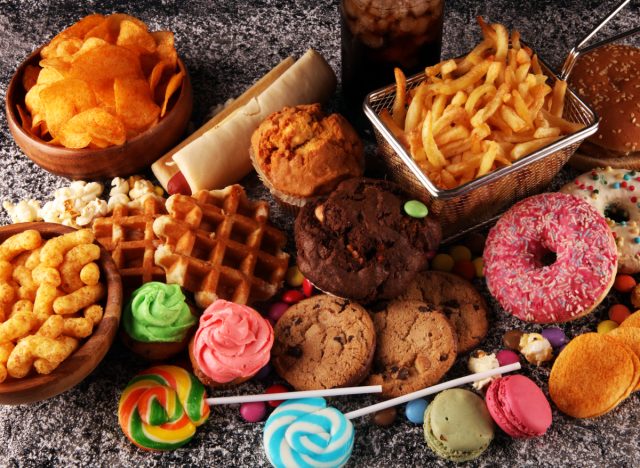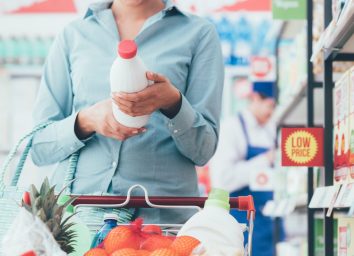Thousands Of Unregulated Chemicals Are Currently In Your Food, Experts Say

What if we told you many of those tasty packaged food items like cupcakes, chips, cookies, frozen pizza, pies, candy bars, etc. contain certain chemicals concocted in a lab to help them look and taste more appealing and enjoy a much longer shelf life? Could you live with that? Maybe.
But, what if we also told you that no one on a federal level is making sure these synthetic ingredients are actually safe for you to consume? And what if some of the ingredients in that cupcake have been linked to cancer, disruption of hormones, damage to DNA, heart disease, and obesity? Would you finally put that cupcake down?
During a recent phone interview we conducted with Scott Faber, Environmental Working Group's senior vice president of government affairs, we learned that chemical companies and food manufacturers, not the Federal Food and Drug Administration (FDA) as you'd assume, decide what food additives are safe for consumption. And, that's a problem because some of these ingredients have been banned in other countries for being toxic to humans. According to Faber, food chemicals are "basically unregulated." But don't just take his word for it.
In a recently published report, EWG Legislative Attorney Melanie Benesh and EWG Stabile Law Fellow Olivia Backhaus demonstrated that 99% of food chemicals that have made their way into our food supply since the year 2000, were approved by food and chemical companies, not the FDA.
In 1958, Congress passed a law requiring the FDA to do a pre-market review of the vast majority of food additives/chemicals to determine their safety before they were allowed into our food, Faber explained. But, this law also included an exclusion for food substances with GRAS (Generally Recognized As Safe) status. This exclusion has become a much-exploited loophole, allowing thousands upon thousands of unregulated ingredients into our food.
"No one in 1958 could have ever imagined that 99% of food chemicals would come in through that loophole," Faber said.
When GRAS was created, it was meant to apply to things that truly are recognized as safe, such as common ingredients like flour, vinegar, and spices. But, "it wasn't intended to apply to brand new chemistries" like synthetic food additives and chemicals, Benesh told us on the phone.
How is this possible?

Benesh explained that because pre-market approval took so long for the FDA to conduct, chemical companies started using the GRAS loophole to get their chemical wares to market much faster. Under the law, manufacturers are not only allowed to determine if their chemicals are generally recognized as safe for their intended use, but they don't have to prove it, nor do they have to notify the FDA about these ingredients.
That brings us to another point. Consumer Reports revealed there are potentially thousands of ingredients added to foods that aren't even on the GRAS list or any other list for that matter. According to Benesh, this "inherent secrecy" surrounding GRAS, "makes it difficult for consumers, and, frankly, makes it difficult for the FDA to know what's on the market and what's not safe."
Who's to blame?
If you ask Benesh, the blame for this lies solely on the FDA. "They've allowed this loophole to get out of control," she said. "They haven't used the enforcement authority they do have to crack down on companies that are exploiting this loophole and marketing unsafe ingredients."
An FDA spokesperson said in an email that the GRAS standard requires ingredients to "meet the same safety standard as food additives" and that their safety in food is "widely recognized by qualified experts" in the industry and the scientific community.
But who those experts are is anyone's guess because this isn't regulated either. "It wasn't intended to be a couple of scientists sitting in the room, some of whom are probably being paid by the food chemical companies themselves, deciding that these chemicals are safe," Benesh said.
The FDA spokesperson did say the FDA can question the basis for an independent GRAS conclusion and take action where "appropriate." Additionally, the FDA will "continue to strongly encourage companies to inform the agency of GRAS conclusions through the notification procedure. While the FDA can question the basis for an independent GRAS conclusion, whether notified or not, and take action as appropriate, the notification procedure yields important information that aids the agency's food safety monitoring efforts."
But that's not enough for EWG and other consumer safety advocacy groups. "We need Congress to narrow that [GRAS] loophole to require more transparency and put the FDA back in the driver's seat," Benesh said.
Closing the loophole
In 2021, the Center for Science in the Public Interest (CSPI) helped introduce and lobby for Rep. Rosa DeLauro's Toxic Free Food Act (H.R. 3699) to help narrow the GRAS loophole considerably. This bill, if enacted, would prohibit newly synthesized, novel, or carcinogenic substances from qualifying as GRAS substances, require pre-market notification and submission of adequate safety data for substances eligible for GRAS, and direct the FDA to systematically reassess current GRAS substances that do not meet the new requirements.
According to Congress.gov, this bill was introduced on June 4 of 2021 and was referred to the subcommittee on health on June 7 of the same year. So, it is still in the first stage of the legislative process.
Do we even need these food additives?
According to Benesh, we don't even need these additives in our food. There are a number of chemical food additives allowed in the United States today that have been banned in other countries. These include titanium dioxide, potassium bromate, propyl paraben, BHA, and BHT. Because of that, food manufacturers can conceivably make the same cupcake but with different ingredients depending on where it's being sold.
According to Jaydee Hanson, policy director for the Center for Food Safety, "Mars Corp. said they would eliminate it [titanium dioxide] from everything, but they only did it from products in Europe."
Conversely, a Mars Wrigley spokesperson said, "At Mars Wrigley, consumer satisfaction is our top priority. We are continuously listening to our consumers and have committed to removing titanium dioxide from our global portfolio by the end of 2023." But they didn't respond to questions about why certain products could be made without ingredients like titanium dioxide for Europe but not yet for the United States.
If you're wondering what titanium dioxide is, Hanson said it basically makes a food product "slightly antimicrobial" and look "really shiny." Think about it. If a candy bar is sitting around in a rest-stop vending machine for a long time, it'll at least be a little "fresher," he joked.
Fresher, sure, but is it worth the risk?
"The additives are there to make the food last longer, look more appealing, or have a bolder or more vibrant flavor," Benesh said. "We can make good food without them."









